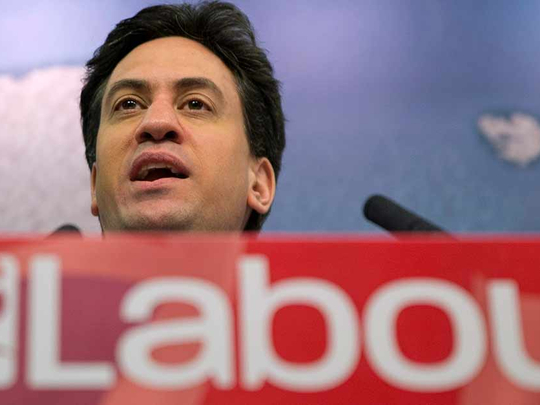
London: British opposition leader Ed Miliband accused David Cameron’s government of “small-minded isolationism” in an election campaign speech on Friday, but sparked a row after suggesting the prime minister was partly responsible for the Mediterranean migrant crisis.
In a foreign policy address ahead of the May 7 vote, the Labour party leader said Conservative Party leader Cameron had “stepped away from the world” and was risking the national interest by promising a referendum on Britain’s European Union membership.
“David Cameron has presided over the biggest loss of influence for our country in a generation,” Miliband told the audience at think tank Chatham House in London.
“It is time to reject the small-minded isolationism that has characterised this government.
“This government’s approach has weakened Britain at a time when the challenges are perhaps greater and more complex than at any time since the Second World War.”
Foreign policy has been little debated in the campaign aside from references to immigration, something the Labour Party said showed the “growing insularity of British politics”.
Miliband described Cameron’s absence from peace talks on the Ukraine crisis between French, German, Russian and Ukrainian leaders as an “apt symbol of Britain’s isolation and waning influence”.
But the Conservatives reacted angrily when Miliband appeared to partly blame Cameron’s policy on Libya for the Mediterranean boat tragedies.
Some 1,500 migrants have died already this year on overloaded vessels setting out from North African nations such as Libya, which is engulfed in civil war.
In his speech, Miliband said that “Cameron was wrong to assume that Libya’s institutions could be left to evolve and transform on their own” following military action to oust former leader Moamer Kadhafi, but did not directly link it to the migrants’ plight.
A pre-speech press release, however, said Miliband “will say the refugee crisis and tragic scenes this week in the Mediterranean are in part a direct result of the failure of post-conflict planning for Libya”.
Cameron called the comments “ill-judged” while former Conservative foreign secretary William Hague accused the opposition leader of “opportunistic taking advantage of human tragedy in order to serve the electoral purposes of the Labour Party”.
Miliband’s Labour party and Cameron’s Conservatives are neck-and-neck in polls, but this week the main betting shop firms made Miliband their favourite to become prime minister for the first time.
Advocating a “hard-headed multilateralism”, Miliband said Cameron had capitulated to the anti-EU UK Independence Party by promising a referendum on Britain’s membership of the bloc in 2017 if he is re-elected prime minister.
“He has taken us to the edge of European exit because he has been too weak to control his own party and too anxious about the rise of UKIP, a rise he could and should have challenged, but pandered to instead,” Miliband said.
“Leaving Europe would be profoundly damaging to the lives or our people and the future of our country. We will never put our national interest at risk by threatening to leave.”
A former energy minister, Miliband stressed the importance of climate change in his foreign policy, calling for a zero carbon emission target by 2050.
Neither the Conservative nor the Labour party is expected to win an outright majority in the election, meaning they will have to rely on the support of smaller parties in order to govern.











